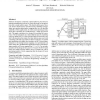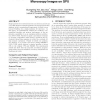122
click to vote
ASPLOS
2012
ACM
13 years 9 months ago
2012
ACM
Software developers commonly exploit multicore processors by building multithreaded software in which all threads of an application share a single address space. This shared addre...
120
click to vote
CC
2002
Springer
15 years 1 months ago
2002
Springer
Global variable promotion, i.e. allocating unaliased globals to registers, can significantly reduce the number of memory operations. This results in reduced cache activity and less...
106
click to vote
CGF
2008
15 years 2 months ago
2008
We present the Memory Trace Visualizer (MTV), a tool that provides interactive visualization and analysis of the sequence of memory operations performed by a program as it runs. A...
135
click to vote
ISCA
1996
IEEE
15 years 6 months ago
1996
IEEE
Memory latency is an important bottleneck in system performance that cannot be adequately solved by hardware alone. Several promising software techniques have been shown to addres...
ISCA
1997
IEEE
15 years 6 months ago
1997
IEEE
Prefetching is one approach to reducing the latency of memory operations in modern computer systems. In this paper, we describe the Markov prefetcher. This prefetcher acts as an i...
125
click to vote
ASPLOS
1998
ACM
15 years 6 months ago
1998
ACM
Optimizations aimed at reducing the impact of memory operations on execution speed have long concentrated on improving cache performance. These efforts achieve a reasonable level...
116
click to vote
ISCA
1999
IEEE
15 years 6 months ago
1999
IEEE
Sequential consistency (SC) is the simplest programming interface for shared-memory systems but imposes program order among all memory operations, possibly precluding high perform...
ICS
2009
Tsinghua U.
15 years 6 months ago
2009
Tsinghua U.
Single-particle 3D reconstruction from cryo-electron microscopy (cryo-EM) images is a kernel application of biological molecules analysis, as the computational requirement of whic...
95
Voted
SC
2004
ACM
15 years 7 months ago
2004
ACM
The Merrimac supercomputer uses stream processors and a highradix network to achieve high performance at low cost and low power. The stream architecture matches the capabilities o...
125
click to vote
IEEEPACT
2006
IEEE
15 years 8 months ago
2006
IEEE
This paper describes a compiler for stream programs that efficiently schedules computational kernels and stream memory operations, and allocates on-chip storage. Our compiler uses...



